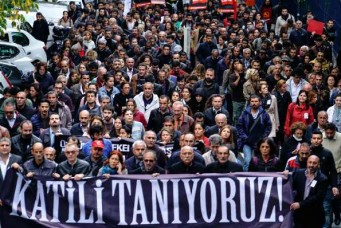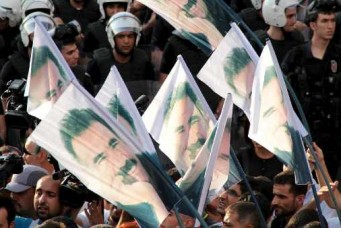Newfound Optimism for Turkey’s Opposition
Turkey’s opposition parties have moderated their ideologies and coordinated their strategies to collectively win more votes in the upcoming elections, which could deal a blow to the ruling AKP.

Meral Aksener, leader of the opposition Iyi (Good) Party and a candidate in the June 24 presidential snap election, arrives at Anitkabir, the mausoleum of modern Turkey’s founder Mustafa Kemal Ataturk, to attend a Youth and Sports Day celebration in Ankara, Turkey May 19, 2018. Murad Sezer/Reuters
With Turkey set for snap presidential and parliamentary elections on June 24, many believe these elections are the final chance to revive Turkish democracy, which has slid into authoritarianism under the Justice and Development Party’s (AKP) rule. Given the incumbent government’s grip on the media, security forces, and the judiciary, few are optimistic about the country’s political environment and democracy. Despite all of these constraints, however, opposition parties are looking to demonstrate to voters that they are viable alternatives to the ruling AKP. If this trend continues, the ruling AKP government might be pressed to give up its illiberal policies or lose a significant portion of its support base.
The AKP has faced three major opposition parties since the beginning of its tenure in 2002: the center-left secular Republican People’s Party (CHP), the largest opposition party; the right-wing Nationalist Movement Party (MHP); and the pro-Kurdish, left-wing Peoples’ Democratic Party (HDP). Over the past sixteen years, the AKP managed to secure the electoral support of a sufficiently large group of center-right conservative voters, primarily due to the opposition parties’ reluctance to relax their rigid ideological boundaries.
For example, until very recently, the CHP aggressively advocated extremely secular policies, such as a headscarf ban at universities and public institutions, despite the overwhelming majority of the Turkish population’s opposition to such a ban. Also, despite its leftist rhetoric, the CHP was known as the party of wealthier and elite citizens. The pro-Kurdish parties mostly focused on Kurdish voters for several years, an approach that started gradually changing only after the creation of the HDP in 2012. In contrast, the MHP’s rhetoric was predominantly based on anti-Kurdish and anti-terrorism policies, lacking effective policy proposals for other main issue areas.
Since the MHP announced a pre-electoral coalition with the AKP in April 2018, it is no longer part of the opposition. And though this could boost parliament’s support for the AKP, polls show that the MHP brought only half of its support base from the opposition to the government side. Instead, two new parties have emerged alongside the CHP and HDP as important opposition actors: the newly formed nationalist İyi (“Good”) Party and the religiously conservative Felicity Party (SP).
Significantly, these parties show signs of ideological moderation, which should allow them to maximize votes and cut into the extensive center-right voter segment that currently supports the AKP. For example, the pro-Kurdish, far-left HDP nominated center-left candidates, such as Ahmet Şık, a famous journalist who has been imprisoned by the government twice for his reporting over the last few years. Likewise, the center-left CHP announced that its presidential candidate is Muharrem Ince, a former high school teacher from a middle-class, conservative family in Yalova, a small Anatolian province. Several of his close family members (including his mother) wear headscarves, and the CHP has been promoting pictures of Ince’s family through the media as part of its election campaign in hopes of changing perceptions that they are too secularist. Ince also pledged that his party will never attempt to bring back the headscarf ban. Out of the 600 legislative seats at stake across the country, CHP also reserved nine candidacy positions for the religiously conservative SP. While this is mainly to demonstrate to voters that it is no longer an anti-religious party, in return the CHP also expects the SP will thus support them if their presidential candidate makes it to the second round of voting. There is a significant chance that, with this election campaign, the CHP may weaken its old negative reputation as a hardcore secularist and elitist party, at least among a portion of voters.
The İyi Party, is a split from the MHP founded by former Minister of Interior Meral Akşener in October 2017 after the MHP rejected her bid to run for party chair, and polls show that it has taken with it about half the support that voters had previously given the MHP. Yet unlike the MHP, İyi Party does not base its rhetoric exclusively on anti-Kurdish policies, and on May 15 Akşener even supported the release of the pro-Kurdish HDP’s imprisoned presidential candidate, Selahattin Demirtaş. In its party program, İyi has also promised more democracy, individual freedoms, and regional economic development for southeastern (predominantly Kurdish) Turkey. Similarly, although the SP stems from the religiously conservative National Outlook tradition like the AKP does, on several occasions, Temel Karamollaoğlu, the SP’s presidential candidate and party chairman, has denied that they are political Islamists. Instead, he stressed that he wants to be defined simply as a Muslim. He also noted that although preventing another headscarf ban is important, issues like education are just as crucial for Turkey.
In addition to this shift toward the center, opposition parties have formed strategic alliances with each other to combat the AKP’s electoral tactics. For example, the AKP wanted to prevent the newly formed İyi Party from entering the parliamentary election by invoking electoral regulations that require parties to either have 20 deputies currently in parliament in order to run, or have held a party congress within the six months before the election—something İyi was unable to organize on such short notice. However, in a surprising and possibly unprecedented move, the major opposition party (CHP) asked 15 of its members in the parliament to temporarily join the five parliamentary members already in İyi so that the party would meet the minimum membership requirement.
Additionally, the CHP mobilized thousands of its supporters to support İyi’s and the SP’s presidential candidates to reach the 100,000 signatures required to make them eligible to run in the upcoming presidential election. These strategies improved the relationships between the elites and supporters of the opposition parties and should facilitate electoral cooperation to oust incumbent President Recep Tayyip Erdoğan in a potential second round of voting.
Finally, contrary to the previous presidential election, the opposition parties each nominated names among the top party leadership as their presidential candidates, which has energized their supporters. It looks like the opposition learned its lesson from the 2014 presidential election, in which the CHP and MHP nominated nonpartisan Ekmeleddin İhsanoğlu, a unity candidate who ultimately failed to energize the parties’ core supporters. This resulted in AKP’s single-round victory due to low turnout among supporters of the opposition groups. More importantly, should the ruling AKP fail to win 50 percent of the vote in the first of the two scheduled rounds of the election, the current candidates—the CHP’s Muharrem Ince, İyi’s Meral Akşener, and the SP’s Temel Karamollaoğlu—are open to supporting whichever opposition candidate survives into the second round.
Still, the opposition parties need to expand the scope of their electoral campaigns. While both moderation and collaboration are great initial steps for electoral purposes, these may fall short. Currently their campaigns are limited to the rallies (usually broadcasted live by candidates’ social media accounts), mobilizing core supporters, and visiting undecided voters in the provinces. Yet in addition to these tactics, presidential candidates need to announce the names of at least some of their prospective ministers. For example, given the unprecedented fall of the Turkish lira during the last week and overall anticipated future macroeconomic problems, a team of promising experts on the economy may attract large voter segments who are suffering from changes to the exchange rate. And to date none of the opposition’s presidential candidates have announced their vice-presidential candidates, who together could hold simultaneous rallies in more than one province.
If the opposition campaigns can reach and convince undecided, independent, apolitical voters before the election day, they may manage to further increase their popular support. Ultimately this will either push the AKP to tone down its authoritarian policies or oust Erdoğan from office.
This article is reprinted with permission of Sada. It can be accessed online here.
Abdullah Aydogan is a research scholar at Rice University’s Baker Institute for Public Policy focusing on democratization and political institutions in the Middle East. Follow him on Twitter @abdaydgn.




